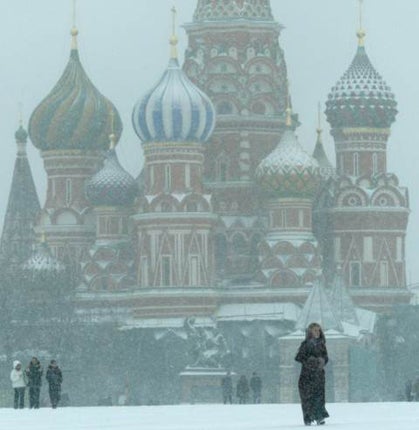Russia frozen in time by plan to brighten the bleakest winter

Your support helps us to tell the story
From reproductive rights to climate change to Big Tech, The Independent is on the ground when the story is developing. Whether it's investigating the financials of Elon Musk's pro-Trump PAC or producing our latest documentary, 'The A Word', which shines a light on the American women fighting for reproductive rights, we know how important it is to parse out the facts from the messaging.
At such a critical moment in US history, we need reporters on the ground. Your donation allows us to keep sending journalists to speak to both sides of the story.
The Independent is trusted by Americans across the entire political spectrum. And unlike many other quality news outlets, we choose not to lock Americans out of our reporting and analysis with paywalls. We believe quality journalism should be available to everyone, paid for by those who can afford it.
Your support makes all the difference.There's not much that the Kremlin can do to get rid of the long and difficult Russian winter – but it has decided that it can abolish "winter time", in a move announced this week by President Dmitry Medvedev.
The clocks will go forward to summer time as usual this spring, but they will not change back to winter time in the autumn. Mr Medvedev argues that changing the clocks twice a year causes "stress and illness" among Russians. "It's just irritating. People either oversleep or wake up early and don't know what to do with the hour," he explained.
Some critics wondered whether Mr Medvedev, who has promised to reform Russia but has delivered precious little nearly three years into his presidency, might not have more pressing issues to worry about. But for many years the issue of time changes in Russia has been a hot topic. When Mr Medvedev mooted the idea during one of his first major political addresses, it got a louder ovation from the assembled officials than any other policy.
The move has won support among Russian doctors, who claim the clock changes disrupt natural body rhythms. The head paediatrician at Russia's Ministry of Health, Alexander Baranov, was "fully supportive" of the President's decision this week. "Moving the clocks here and there has a bad influence on people's health, on their moods, and on their capacity to work," he said. "Children suffer particularly, when they have to be woken up ahead of time."
A posting on the Kremlin's website quoted top government aide Arkady Dvorkovich saying the move would result in between 7 and 17 per cent more daylight hours in various Russian regions. Winter days in many Russian cities are depressingly short – in some parts of the north the sun does not rise at all for two months. The new move means the afternoons will be longer, but also that the mornings will be darker.
Some wondered whether extra hours in the evening were really worth paying for with the misery of dark and gloomy mornings. Academics in St Petersburg said that the city would now be two hours ahead of its "natural" time zone in winter. And from the end of this year, when people cross Russia's border with Norway during the winter, they will have to move their clocks forward by three full hours.
It is not the first time that Mr Medvedev has meddled with time. There have also been a number of changes in individual regions, aimed at bringing the vast landmass of Russia closer together. Last year, the country was compacted from 11 time zones down to nine, with regions in the very far east of the country moving from nine to eight hours ahead of Moscow, to help ease local governance and communications with the capital.
With talk in the air of an impending further one-hour cut, there were protests in the far-eastern Kamchatka Peninsula last year, with thousands taking to the streets shouting "Give us our time back!".
Authorities tried to ban a New Year's Cinderella panto in the region's capital, Petropavlovsky-Kamchatsky, as they suspected that a scene where the King changes the time to allow Cinderella to remain at the ball was a subversive jibe aimed at the Russian government. Further time changes are planned this year, with several Siberian regions clumped together, wiping out time differences between them.
But while time changes remain controversial, a survey showed that 60 per cent of Russians support the abolition of winter time. "We will have prolonged daylight and I think this will be healthy for our country," said Mr Medvedev.
In a final justification for the move, he employed a folksy farmyard metaphor of the kind his political rival Vladimir Putin likes to use, though people were left unsure exactly what he meant. "I'm not talking about unhappy cows or other animals who don't understand the time change and don't understand that the milkmaid is going to milk them at a different time," said the Russian President.
Join our commenting forum
Join thought-provoking conversations, follow other Independent readers and see their replies
Comments